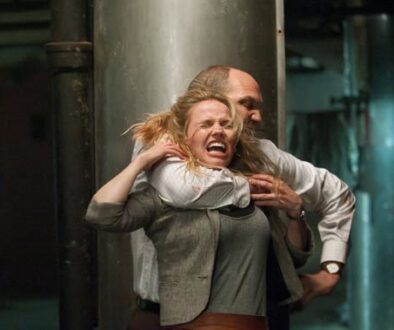Torchwood: Miracle Day Episode 6 Review

Clint Hassell reviews The Middle Men, the sixth episode of Torchwood: Miracle Day.
In reading other critical reviews and comments from fans, I’ve noticed that “The Middle Men” seemed to be the catalyst for comments about the pacing of Torchwood: Miracle Day. Many have commented that the series is moving too slowly, and that the individual episodes are too padded and lacking sufficient action to be as captivating as previous series. While I disagree – Torchwood has grown beyond its sexy, adult, sci-fi premise and its done-in-one episodes to become a miniseries that examines deeply the human condition using science fiction as a backdrop, thus necessitating the methodical, deliberate storytelling evident in Children of Earth and Miracle Day – I must admit that “The Middle Men” really doesn’t accomplish much. Esther and Rex escape the overflow camp and Maloney is killed, but neither of those events further the overall plot; they merely wrap up storylines from the previous episode. Jack gathers information about PhiCorp’s involvement in the “miracle,” only to discover that PhiCorp might not be as involved as expected, thus making that entire, five-episode storyline a red herring. Gwen gives a speech about ethics to a doctor and then rescues her dad, only to have the rest of her family abducted. (And even that plot line is resolved in the very next episode.) Do you see how, despite individual plot lines moving forward, the overall narrative of Miracle Day remains stagnant? I believe the concept behind Miracle Day is strong enough to support a 10-episode miniseries and I’m disappointed that this episode does so little to further the story.
Even worse, I was not passionate about this episode. The opposite of love isn’t hate – it’s apathy – and, in many ways, I’d rather watch an episode that causes me to write a pages-long response decrying all that was wrong and everything that I hated rather than view an episode that doesn’t inspire me to do anything at all. There was very little in “The Middle Men” that excited me enough that I paused the episode to make notes while watching, and almost all of those moments were marred by plot holes that ruined any storytelling potential in the scene.
But I still have to write a review, don’t I? OK, let’s take the good with the bad.
The Good: I’m very interested to discover what was being built in China that, when discovered, would cause Zheng Yiabo to deny its existence and then jump off a building. Since this plot thread seems more like an exciting teaser (“Gasp! He joined the 45 Club about which we just learned! No coincidence there!”) and less of a serious attempt at plot advancement, I will not be surprised if we do not ever learn what Yiabo saw. My guess would be, he discovered an industrial-sized module, and the knowledge that China was burning its Category 1 patients pushed him over the edge (pun intended).
The Bad: Despite how many times you’ve seen it on TV and in movies, it’s not possible to shoot off a padlock. It’s an extremely lazy cliché, made even more ludicrous here because the episode shows that there are armed guards mere feet away. Wouldn’t they have heard the shot? It would have been more plausible to have Yiabo quietly pick the lock, or to cut the fence with wire cutters. Yes, having a character fire off a round is exciting and kinetic, but the scene wasn’t about the action, it was about questioning what Yiabo found and the shock of his suicide. His brandishing a firearm was completely unnecessary.
. . . .
The Good: Rex Matheson announces on camera that he is with Torchwood. This moment is pivotal to Rex’s character arc and is supposed to feel big and defiant.
The Bad: . . . but it doesn’t, partially because Rex is grimacing unbelievably through most of the scene. Knowing that Rex is injured, but survives due to the “miracle,” only to live in agony, why would they cast an actor who cannot convincingly fake being in pain? I’ve tried to distance the aspects of the character of Rex that I dislike from the abilities of the actor playing him, but Mekhi Phifer does not believably portray Rex in agony. I particularly dislike the cliché of “I’m in such pain that I carelessly gobble pills straight from the bottle” – especially considering that the bottle is labeled “1 tablet, twice a day, for 3 days.” That’s only six pills. Considering how much trouble Rex has had obtaining medication, wouldn’t he be more careful?
The Ugly: I checked my Physician’s Desk Reference to see what type of medications might be prescribed at such a dosage. Most of the ailments I found were sexually transmitted diseases. Apparently, that metal shaft didn’t just pierce his heart, it gave him chlamydia.
(Total side note: Maybe threatening to kill Maloney on camera wasn’t the smartest thing to do?)
. . . .

The Good: Actually, I’m not sure there is a “good” here, as . . .
The Bad: . . . watching Ralph barely keep it together while Maloney just shut down was eye-rollingly painful. I can’t decide if I’m more offended at the hackneyed writing or the over-the-top acting. I’ve seen more capable actors in a community theatre production of a melodrama. Maloney’s accent is appalling. I’ve seen actor Marc Vann in other works where he’s been serviceable, I guess, but damn, he’s effin’ AWFUL in this. Seriously, at what point can a director step in and say, “This just isn’t working with these two actors”?
The Ugly: Actually, the most offensive thing in this episode is Maloney’s horrible dental work. The real person who should be burned in a module is the dentist who did those veneers on Marc Vann’s front teeth.
. . . .
The Good: I was impressed that Gwen managed to maintain her composure when begging Dr. Patel to change Geraint Cooper’s status from Category 1. We’ve seen so much of badass Gwen lately that I was expecting her to be overly-morally-indignant, to yell, and to threaten Dr. Patel at gunpoint. Seeing Gwen appeal to another’s human side during conflict is what makes Gwen exceptional. Several episodes – including “Random Shoes” and especially “Day One” – have been dedicated to this trait of Gwen’s.
The Bad: Again, how is Gwen still walking around – in scrubs, no less, as if she had any sort of authority or position – seemingly still employed at the overflow camp? She and Rhys were caught trying to smuggle a Category 1 patient out of the camp. How were they not arrested?
. . . .
The Good: Seeing Jack convince Janet to help extract information from Stuart Owens was fun.
The Bad: Several comments have been made that, in both “The Categories of Life” and “The Middle Men,” Jack has been given little to do. I disagree – information gathering is important to Miracle Day’s plot, and it strengthens Jack’s character that he has his own agenda (and you’ll see a lot of Jack in episode 7 [again, pun intended]) – but I wish that Jack’s scenes with Janet and Owens were better written. “I suppose I’ll have the salad,” muses Owens, as if a $45-a-plate restaurant would have only the one salad. And, why is Owens so forthcoming? Jack just confirmed Owens’ infidelity to his wife, yet Owens doesn’t yell or have Jack thrown out of the restaurant – he entertains him at his table and spills everything he knows about PhiCorp’s involvement in the “miracle.” It’s a lot of exposition – and it’s necessary, if not interesting – but it’s not handled well here.
The Ugly: Jack didn’t know that Janet was drinking an appletini? Girl, please. Surrender your gay card immediately.
. . . .

The Good: Yes, Esther taking out a guy twice her size is something seen only on TV, but at least they had her fighting like a girl who has not been formally trained as a CIA field agent. She screams a lot, she claws at his face, she bites, she kicks him in the groin. (Bonus points for Alexa Havins taking a slap like the true soap opera star she is.) However . . .
The Bad: . . . at the exact moment she should be running, she manages the strength to choke him to death? LOL. Right.
. . . .
The Good: Though cliché, I did enjoy the moment when the Hispanic cleaning lady helps Gwen open the door and rescue her father. The scene uses a stranger’s unexpected act of humanity to mirror the evil of the bureaucratic health care system.
The Bad: The atmosphere within the overflow camps is inconsistent, as established by the episode. For example, several overhead shots show that the overflow camps are lit by many swirling searchlights, indicating that this area is under maximum security. Further, the camps are manned by fully-armed military personnel. How are these areas not shoot-on-sight? Gwen and Rhys have time to load Geraint into a truck, detail her return to the U.S., and kiss passionately, while the guards merely lumber toward them like slow-moving zombies. The guards don’t even threaten to shoot. Further, having seen Gwen re-enter the compound, they don’t place the camp on lock-down to find her.
The Ugly: I’m not even going to bother to ask where Gwen got that sexy, black, leather cat suit (the Hispanic cleaning woman?), the motorcycle, or why they would keep C4 explosive at a military medical facility.
. . . .
The Good: Gwen’s saying “no” to the overflow camps was both series- and character-defining.
The Bad: Wait, did Jack just say that he’d opened the “radio link” so that Gwen could record her speech? On the I-5 contact lenses? Because both Children of Earth and Miracle Day make it very clear that a limitation of the I-5s is that they do not transmit sound. So, Gwen must have a radio on her person, right? Then why does she use the contact lenses to contact Jack, instead of the radio? Better yet, why not just use her cell phone to record her speech and the exploding of the overflow camp and upload it directly to her social media site of choice? She wouldn’t really need Jack for that, though, I guess she could have called him, if needed, seeing as how it’s a phone. (And, yes, she has her cell phone with her in Wales – she uses it to call Rhys in the very next scene.)
. . . .

The Good: Having the kidnappers send a ransom note to Gwen via the lenses is a fun narrative trick – a high-impact cliffhanger leading to the next episode – and allowing the kidnappers track Gwen’s moves by seeing what she sees is a creepy and claustrophobic addition to episode 7.
The Bad: How’d the kidnappers hack the I-5s? No one even knows they exist, save for Jack, Gwen and Rhys, Lois Habiba, and several members of the British government (none of whom would wish to discuss the I-5s, lest the reason they knew about them be disclosed to the public – see “Day Five” of Children of Earth). Couldn’t the kidnappers just call her on the phone? (No, because the writer’s keep forgetting she has one!)
. . . .
A final thought: I am surprised that this episode did not involve Oswald Danes or Jilly Kitzinger, both of whom could be described as “middle men” in PhiCorp’s scheme. The previous episode made much of Danes’ frustration at being saddled with a PhiCorp-authored speech, and that Jilly is not in control, but is being noticed by “the right people.” “The Middle Men” seemed like the perfect episode to further both storylines and give each character much-needed development.








